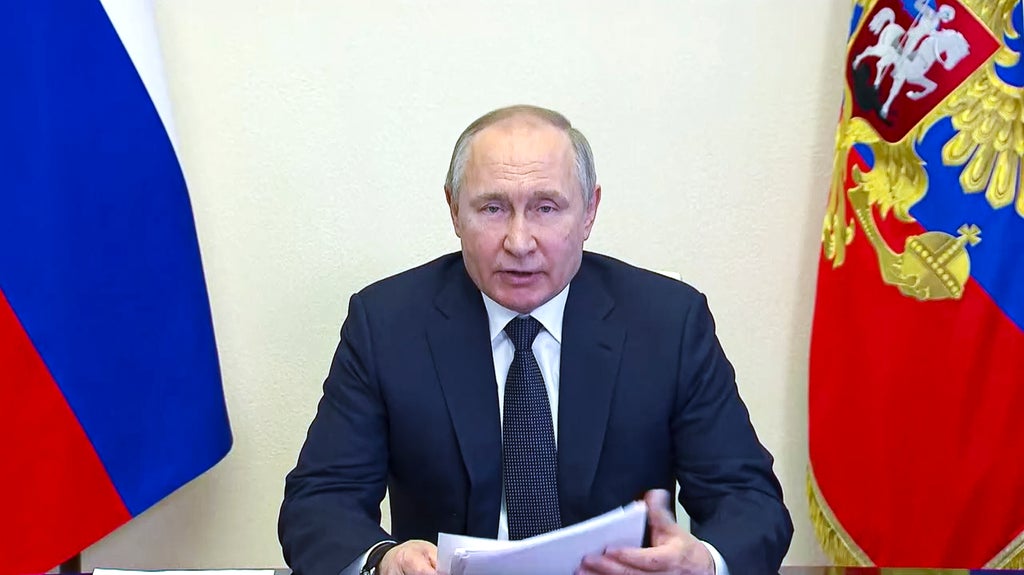
Facing stiff resistance in Ukraine and crippling economic sanctions at home, Russian President Vladimir Putin is using language that recalls the rhetoric from Josef Stalin’s show trials of the 1930s.
Putin's ominous speech on Wednesday likened opponents to “gnats” who try to weaken the country at the behest of the West — crude remarks that set the stage for sweeping repressions against those who dare to speak out against the war in Ukraine.
His rant appeared to reflect his frustration about the slow pace of the Russian offensive, which bogged down on the outskirts of Kyiv and around other cities in northeastern Ukraine. Russian forces made comparatively bigger gains in the south, but they haven't been able to capture the strategic port of Mariupol on the Sea of Azov, and their advance along the Black Sea coast also has stalled.
Meanwhile, Russia has been battered by devastating Western sanctions that cut the government's access to an estimated half of the country's hard currency reserves and dealt crippling blows to many sectors of the economy.
With his hopes for a blitz in Ukraine shattered and economic costs mounting swiftly, Putin unleashed a venomous diatribe at those who oppose his course.
“The Russian people will always be able to distinguish true patriots from scum and traitors and will simply spit them out like a gnat that accidentally flew into their mouths — spit them out on the pavement,” Putin said during Wednesday’s call with top officials. “I am convinced that such a natural and necessary self-purification of society will only strengthen our country, our solidarity, cohesion and readiness to respond to any challenges.”
The coarse language carried ominous parallels for those familiar with Soviet history. During show trials of Stalin's Great Terror, authorities disparaged the declared “enemies of the people” as “reptiles” or “mad dogs.”
His voice strained by anger, Putin charged that Russians who oppose the war in Ukraine were a “fifth column" obsequiously serving Western interests and ready to “sell their own mother.”
“I don't condemn those who have villas in Miami or the French Riviera, those who can't live without foie gras, oysters or so-called gender freedoms,” Putin said. “It's not a problem. The problem is that many of those people are mentally there (in the West) and not here with our people, with Russia. They don't remember or just don't understand that they are just ... expendables used for the purpose of inflicting the maximum damage on our people.”
As he spoke, the Russian State Investigative Committee announced the opening of criminal probes against several people accused of spreading “false information” about the military action in Ukraine.
The first person singled out by the country's top investigative agency was Veronika Belotserkovskaya, a popular blogger and socialite who has written books about French and Italian cuisine and divides her time between Russia and southern France. She appeared to be a target conveniently fitting Putin's scathing description of cosmopolitan Russians who love fancy food and are seemingly at odds with the broad masses.
The investigative committee said it would move to issue an international arrest warrant for Belotserkovskaya, alleging her Instagram posts “discredited” state authorities and the military.
Belotserkovskaya responded by writing: “I have been officially declared to be a decent person!”
She is being investigated under new legislation fast-tracked on March 4 by the Kremlin-controlled parliament, a week after Putin launched the invasion. It envisions prison terms of up to 15 years for posting “fake” information about the military that differs from the official narrative.
Putin and his lieutenants describe the war in Ukraine as a “special military operation” intended to uproot alleged “neo-Nazi nationalists” and remove a potential military threat against Russia— goals that most of the world has rejected as bogus.
Russian officials have attributed the offensive's slow pace to their desire to spare civilians, even as the military pummeled Mariupol, Kyiv, Kharkiv and other Ukrainian cities with indiscriminate barrages and airstrikes, killing untold numbers of civilians.
With the action in Ukraine in stark contrast with official declarations, the authorities acted quickly to control the message, shutting access to foreign media websites, along with Facebook and Instagram and moving to outlaw their parent company Meta as an “extremist” organization.
The tight lids on information have helped the Kremlin rally support of broad layers of the population who rely on state-controlled television as their main source of news. State TV programs carried an increasingly aggressive message against those who oppose the war.
Asked about incidents in which the apartment doors of war critics were spray-painted with the letter “Z” — a sign used to mark Russian military vehicles in Ukraine that has been heavily promoted by the state — Kremlin spokesman Dmitry Peskov described it as an “emotional" move by Putin's supporters.
The campaign in support of the war saw Russian cities flooded with “Z” posters and vehicles emblazoned with it. School children were shown standing in groups in the shape of the letter or wearing clothes marked with a “Z.”
Despite the draconian new laws, tight controls on information and increasingly aggressive propaganda, however, thousands of Russians showed up at antiwar protests across the country to face immediate arrest.
In a powerful symbol of defiance, an employee of state television interrupted a live news program, holding a handmade sign protesting the war. Marina Ovsyannikova was fined the equivalent of $270, but still faces a criminal probe that could land her in prison.
One loud voice of dissent was that of opposition leader Alexei Navalny, Putin's fiercest political foe who is serving 2 1/2 years in prison and now faces a trial that could hand him a 13-year sentence.
In a speech at his trial Tuesday, Navalny warned that the war will lead to the breakup of Russia, saying that “everyone's duty now is to oppose the war.”







